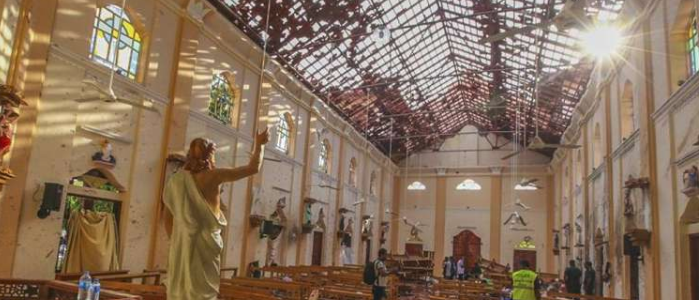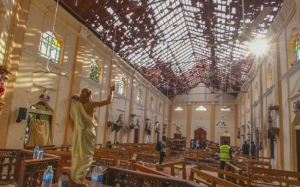
Colombo blasts death toll rises to 359

The Colombo eight blasts death toll targeting mostly churches and hotels on Sunday has risen to 359, including 8 British, according to a police spokesman. 40 suspects have been arrested.
Late yesterday the authorities said they had found and defused an improvised explosive device near the departure lounge at Colombo’s Bandaranaike International airport.The violence began to unfold yesterday morning, when blasts hit three churches in Colombo, the coastal town of Negombo and the eastern town of Batticaloa. The Christians account for 7.3 per cent of a population in a country with a strong Buddhist majority and a small Muslim minority.
The Sri Lankan Government has blamed a little-known local jihadist group, National Thowheed Jamath, with the support of an international network although not body has yet admitted carrying out the bombings. It is thought that some Muslim youths in Sri Lanka were radicalised after clashes last year in Kandy district between the majority Sinhala Buddhists and Muslims. Video posted on social media showed hardline islamists and Sinhala hardliners promoting hatred.
175-year-old St Anthony’s Church, one of the deadliest Easter Sunday bombings site in Colombo’s Kochchikade district, Sri Lanka. Its patron has acquitted a reputation for being a “miracle worker as no request, no matter how large, small or strangely specific, is left unanswered by St Anthony, according to people.
The clock on its left tower is frozen at 8.45 the time blast took place. For Easter Mass, the chief priest thought well over 1, 000 people were in congregation.
According to local legend and the written history of the archdiocesan archives, St Anthony’s Church was built by a priest from Cochin in Southern India, named Father Antonio. He secretly practised Catholicism during the Dutch rule of Colombo in the 18th century although it had been named a proscribed religion. He was able to build the church, the legend says, after performing a miracle. The locals had come to him in panic after seeing the sea rising and asked him to pray for it to recede. He did, and the sea not only receded, but the sand bank suddenly emerged from waters. So he planted a cross there and built a small mud church in which he remained until his death.
President Maithripala Sirisena, who was out of the country when three churches and four hotels were targeted by eight suicide bombers has been at odds with prime minister Ranil Wickremesinghe. His decision to outset the PM and dissolve his cabinet last October was eventually reversed by the Supreme Court.
Indian intelligence officers had warned Sri Lankan counterparts about a possible attack by Islamist militants just two hours before the serial suicide blasts took place on Sunday. On Monday Sri Lankan government apologised for failing to act on intelligence information on possible attacks.
India sent three alerts the first one on April 4, which came from investigations by Indian agencies that followed after the National Investigation Agency (NIA)m in December 2018, stumbled upon the videos of National Thowheed Jama’ NTJ leader Maulvi Zahran Bin Hashim while probing the Islamic State Coimbatore module. The second alert was sent a day before the attack. Prime Minister Ranil Wickremesinghe acknowledged that alerts had been sent by India, who said “ India gave us the intelligence but there has been a lapse on how we acted on that… intelligence was not conveyed down the line” .
But Senarante said Mr Wickremesinghe had not been allowed to resume attending meetings of the security council and so did not hear of the terror warning received nearly three weeks ago on April 4. After wasting five days the defence ministry alerted the chief of police, identifying Islamist group National Thowheed Jamaath as the group most likely to be behind the feared plot. Officers informed courts and foreign embassies of a warning of an alleged planned attack and telecommunications minister Harin Fernando said he had been personally cautioned against going to churches. But defence secretary Hemasin Fernando acknowledged that the tip-off had not been properly acted on.
Number of foreign visitors had gone up 400 per cent since the civil war ended 10 years ago.
